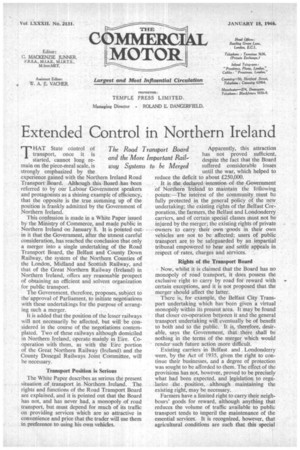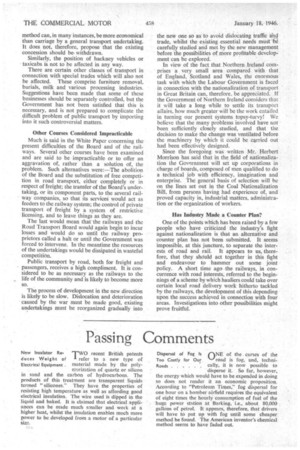Extended Control in Northern Ireland
Page 15

Page 16

If you've noticed an error in this article please click here to report it so we can fix it.
THAT State control of The Road T transport, once it is started, cannot long reand the' More main on the piece-meal scale, is way Systems strongly emphasized by the experience gamed with the Northern Ireland Road Transport Board. Although this Board has been referred to by our Labour Government speakers and protagonists as a shining example of efficiency, that the opposite is the true summing up of the position is frankly admitted by the Government of Northern Ireland.
This confession is made in a White Paper issued by the Ministry of Commerce, and made public in Northern Ireland on January. 8. It is pointed out in it that the Government, after the utmost careful consideration, has reached the conclusion that only a merger into a single undertaking of the Road Transport Board, the Belfast and County Down Railway, the system of the Northern Counties of the London, Midland and Scottish Railway, and that of the Great Northern Railway (Ireland) in Northern Ireland, offers any reasonable prospect of obtaining an efficient and solvent organization for public transport.
The Government, therefore, proposes, subject to the approval of Parliament, to initiate negotiations with these undertakings for the purpose of arranging such a merger.
It is added that the position of the lesser railways will not necessarily be affected, but will be con.sidered in the course of the "negotiations contemplated. Two of these railways although domiciled in Northern Ireland, operate mainly. in Eire. Cooperation with them, as with the Eire portion of the Great Northern Railway (Ireland) and the County Donegal Railways Joint Committee, will be necessary.
Transport Position is Serious The White Paper describes as serious the present situation of transport in Northern Ireland. The rights and functions of the Road Transport Board are explained, and it is pointed out that the Board has not, and has never had, a monopoly of road transport, but must depend for much of its traffic on providing services which are so attractive in convenience and price that the trader will use them in preference to using his own vehicles. ransport Board Apparently, this attraction Important Raildespite the fact that the Board to be Merged suffered considerable losses until the war, which helped to reduce the deficit to about £250,000.
It is the declared intention of the Government -of. Northern Ireland to maintain the following points:—The intei-est of the community, must be fully protected in the general policy of the new undertaking; the existing rights of the Belfast Corporation, the farmers, the Belfast and Londonderry carriers, and of certain special classes must not be injured by the merger; the existing rights of private • owners to carry their own goods in their own vehicles are not to be affected; users of public transport are to be safeguarded by an impartial tribunal empowered to hear and settle appeals in respect of rates, charges and services.
Rights of the Transport Board Now, whilst it is claimed that the Board has no monopoly of road transport, it does possess the exclusive right to carry by road for reward with certain exceptions, and it is not proposed that the merger should affect the latter.
There is, for example, the Belfast City Transport undertaking which has been given a virtual monopoly within its present area. It may be found that closer co-operation between it and the general transport undertaking will eventually be of benefit to both and to the public. It is, therefore, desirable, says the Government, that there shall be nothing in the terms of the merger which would render such future action more difficult.
Existing carriers in Belfast and Londonderry were, by the Act of 1935, given the right to continue their businesses, and a degree of protection was sought to be afforded to them. The effect of the provisions' has not, however, proved to be precisely what had been expected, and legislation to regularize the. position, although maintaining the existing right, may be necessary.
Farmers have a limited right to carry their neighbours' goods for reward, although anything that reduces the volume of traffic available to public transport tends to imperil the maintenance of the essential services. It is recognized, however, that agricultural conditions are such that this special method can, in many instances, be more economical than carriage by a general transport undertaking. It does not, therefore, propose that the existing concession should bewithdrawn.
Similarly, the position of hackney vehicles or taxicabs is not to be affected in any way.
There are certain other classes of transport in connection with special trades which will also not be affected. These comprise furniture removal, burials, milk and various processing industries. Suggestions have been made that some of these businesses should be separately controlled, but the Government has not been satisfied that this is necessary, and is not prepared to complicate the difficult problem of public transport by importing into it such controversial matters.
Other Courses Considered Impracticable Much is said in the White Paper concerning the present difficulties of the Board and of the railways. Several other courses have been examined and are said to be impracticable or to offer an aggravation of, rather than a solution of, the problem. Such alternatives were:—The abolition of the Board and the substitution of free competition in road transport, either completely or in respect of freight; the transfer of the Board's undertaking, or its component parts, to the several railway companies, so that its services would act as feeders to the railway system; the control of private transport of freight by a system of restrictive licensing, and to leave things as they are.
The last would mean that the railways and the Road Transport Board would again begin to incur losses and would do so until the railway proprietors called a halt or until the Government was forced to intervene. In the meantime the resources of the undertakings would be dissipated in. wasteful competition.
Public transport by road, both for freight and passengers, receives a high compliment. It is considered to be as necessary as the railways to the life of the community and is likely to become more so.
The process of development in the new direction is likely to be slow. Dislocation and deterioration caused by the war must be made good, existing undertakings must be reorganized gradually into the new one so as to avoid dislocating traffic and trade, whilst the existing essential needs must 6e carefully studied and met by the new management before the possibilities of more profitable development can be explored.
In view of the fact that Northern Ireland comprises a very small area compared with that of England, Scotland and Wales, the enormous task with which the Labour Government is faced in connection with the nationalization of transport in Great Britain can, therefore, be appreciated. If the Government of Northern Ireland considers that it will take a long while to settle its transport affairs, how much greater will be the work entailed in turning our present systems topsy-turvy! We believe that the many problems involved have not been sufficiently closely studied, and that the decision to make the change was ventilated before the machinery by which it could be carried out had been effectively designed.
Since the foregoing was written Mr. Herbert Morrison has said that in the field of nationalization the Government will set up corporations in charge of boards, composed of men qualified to do a technical job with efficiency, imagination and enterprise. The general basis of selection will be on the lines set out in the Coal Nationalization Bill, from persons having had experience of, and proved capacity in, industrial matters, administration or the organization of workers.
Has Industry Made a Counter Plan?
One of the points which has been raised by a few people who have criticized the industry's fight against nationalization is that an alternative and counter plan has not been submitted. It seems impossible, at this juncture, to separate the interests of road and rail. It appears to us, therefore, that they should act together in this fight and endeavour to hammer out some joint policy. A short time ago the railways, in concurrence with road interests, referred to the beginnings of a scheme by which hauliers could take over certain local road delivery work hitherto tackled by the railways, the development of this depending upon the success achieved in connection with four areas. Investigations into other possibilities might prove fruitful.




























































